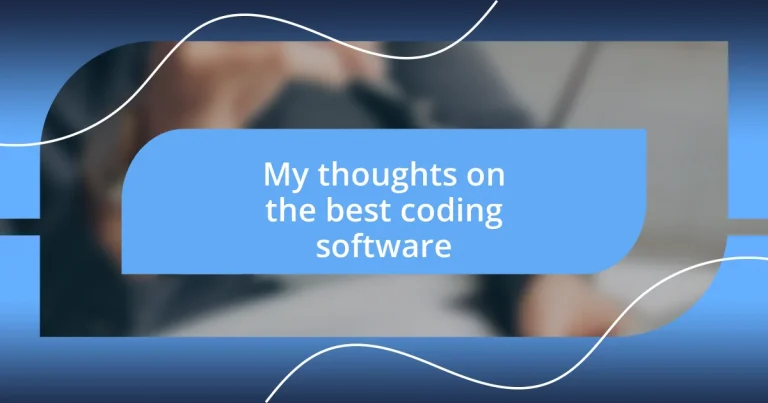Key takeaways:
- Choosing the right coding software greatly influences productivity and learning, with options ranging from simple text editors like Visual Studio Code and Notepad++ to advanced IDEs like JetBrains IntelliJ IDEA.
- Key features to consider include user interface design, customization options, performance, version control integration, cross-platform compatibility, and community support.
- User experiences highlight the importance of intuitive design and intelligent coding assistance, which can transform challenging situations into empowered coding sessions.
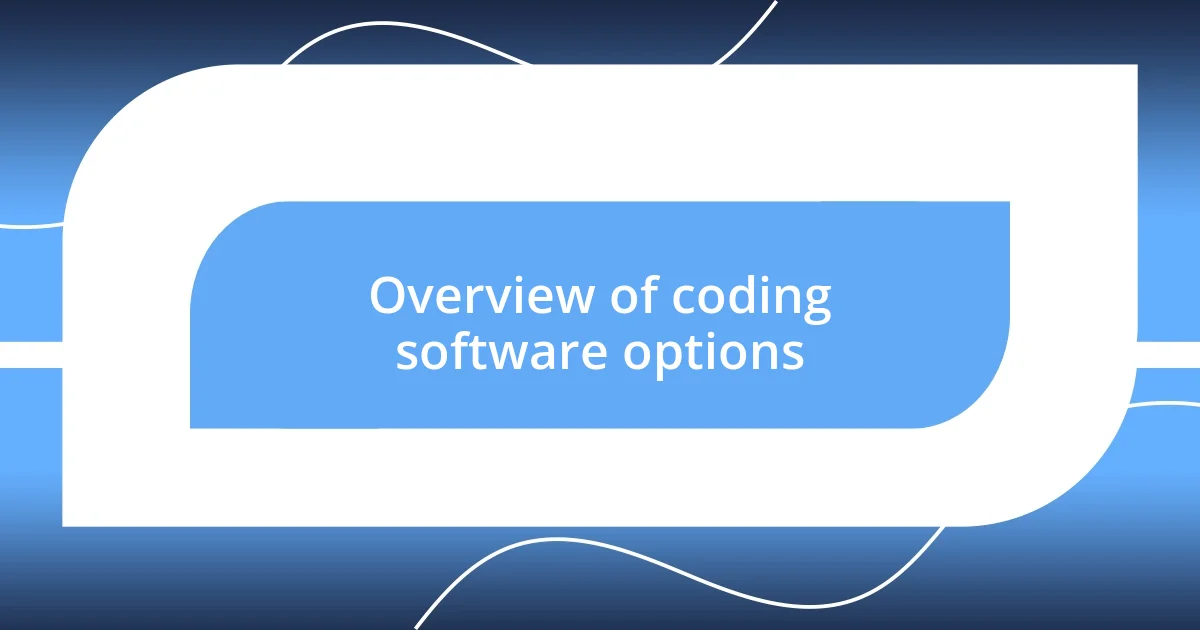
Overview of coding software options
When exploring coding software options, it’s essential to consider the diverse range available today. From lightweight text editors like Visual Studio Code, which I absolutely adore for its simplicity and powerful extensions, to fully integrated development environments (IDEs) like JetBrains’ IntelliJ, each serves different needs. I remember the first time I used a code editor that didn’t overwhelm me with complexity—it was liberating!
Have you ever found yourself stuck in a cluttered interface that complicated your coding process? I certainly have. That’s why I appreciate options like Sublime Text, which strikes a balance between simplicity and functionality. It was during a late-night coding session that I discovered its “Goto Anything” feature, and it changed how I navigated my projects entirely—talk about a game-changer!
Moreover, the choice between free and paid software can often dictate a coder’s workflow. For instance, while I do have a fondness for the robust capabilities of paid software, I often turn to open-source alternatives like Atom or even Notepad++ for quick projects. Isn’t it fascinating how the right tools can significantly boost our coding efficiency and creativity?
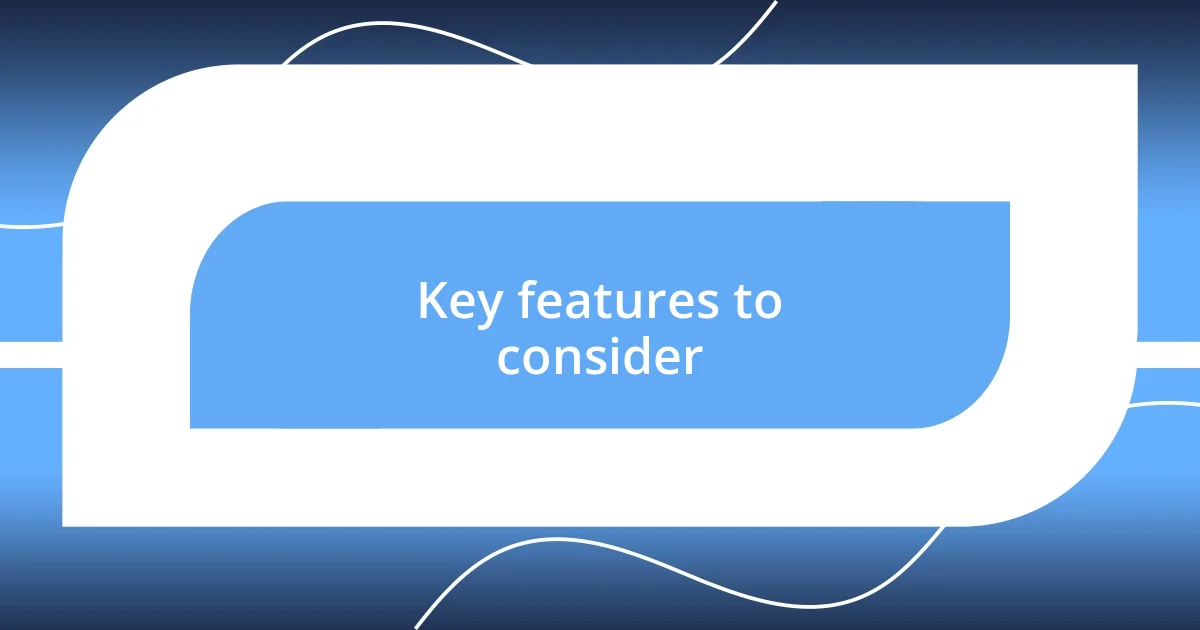
Key features to consider
When evaluating coding software, a few key features stand out to me based on personal experiences. It’s crucial to look for an intuitive user interface that minimizes distractions—I’ve spent countless evenings frustrated by clunky layouts that made even the simplest tasks seem daunting. Additionally, strong community support can make all the difference. I recall how seeking help on forums for my favorite editor, VS Code, often led to breakthroughs that saved me hours of trial and error.
Here are some features to consider when selecting coding software:
- User Interface Design: A clean, minimalist layout helps maintain focus.
- Customization Options: Being able to tweak settings and add extensions enhances productivity.
- Performance: Fast load times and efficient resource use matter, especially on larger projects.
- Version Control Integration: Simplifies collaboration and helps track changes.
- Cross-Platform Compatibility: Ensures you can work seamlessly on different devices.
- Community and Support: Active forums and resources can provide invaluable assistance when you’re stuck.
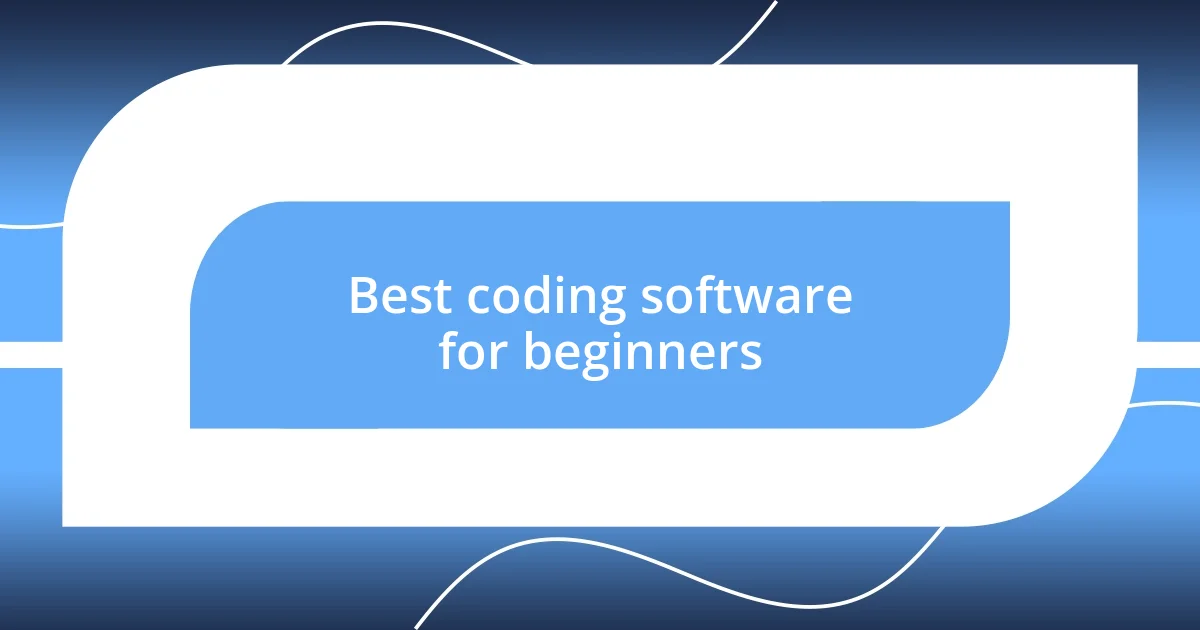
Best coding software for beginners
Choosing the best coding software for beginners can dramatically affect one’s early coding journey. Personally, I’ve seen newcomers flourish with simple tools like Visual Studio Code, especially because it offers a vast library of extensions. I vividly remember mentoring a friend who was just starting out; the way VS Code suggested code completions and displayed errors in real-time made the learning curve feel less steep for her.
Another fantastic option is Thonny, particularly for those venturing into Python. I recall the sense of relief when I first discovered its debugger, which helped me understand my code step-by-step. For beginners, the clarity it provides can transform confusion into confidence, making programming a lot less intimidating. It’s all about finding that initial spark of inspiration, right?
Using lightweight editors such as Notepad++ can also be encouraging. They can be perfect for small projects without the unnecessary complexity of larger IDEs, which I sometimes find overwhelming—as I did when I first started learning to code. Each beginner’s experience is unique, and finding the right software can make all the difference.
| Software | Best For |
|---|---|
| Visual Studio Code | General coding with extensions |
| Thonny | Python beginners |
| Notepad++ | Lightweight text editing |
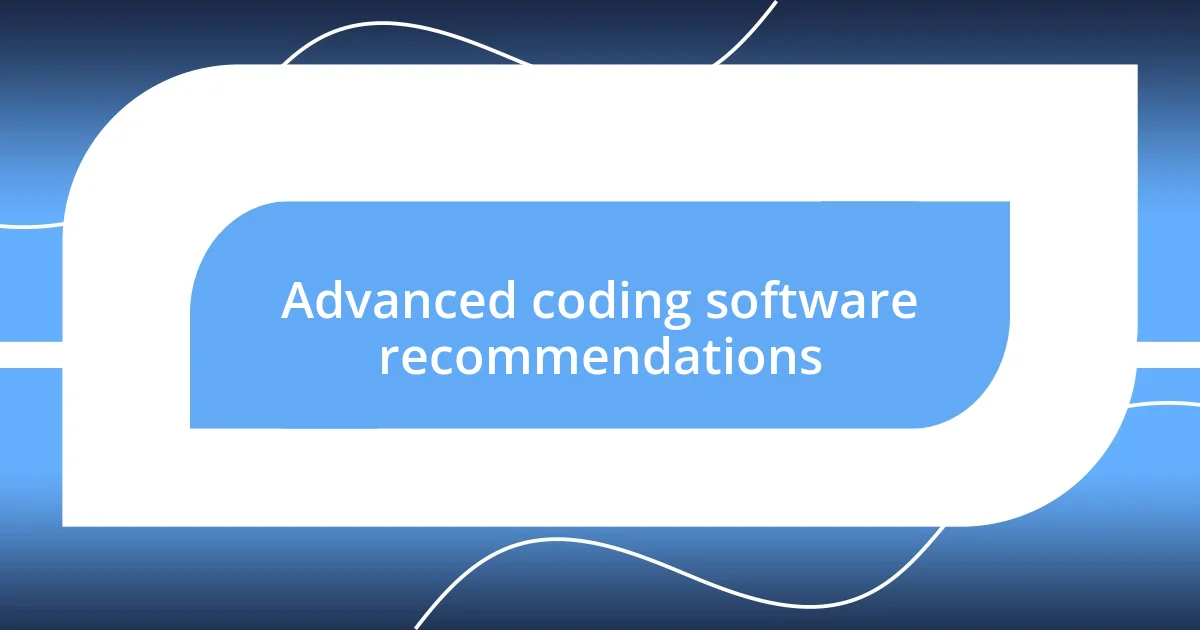
Advanced coding software recommendations
When it comes to advanced coding software, my top recommendation has to be JetBrains IntelliJ IDEA. It’s a powerhouse for Java development, but I’ve found it equally effective for other languages thanks to its smart code completion and deep integration with version control systems. I remember how this software dramatically reduced the time I spent on debugging and enhancing features. Have you ever experienced that satisfying moment when the IDE finds errors you never would have spotted? It’s a huge relief!
Another remarkable option is Visual Studio, particularly for C# and .NET developers. The extensive toolset feels overwhelming at first, but once you get acquainted, it becomes an invaluable ally, especially when working on large, enterprise-level applications. I distinctly recall diving into a project where the integrated debugging tools saved me countless hours—I was genuinely amazed at how easy it made stepping through my code. Isn’t it nice to have a software that truly understands what developers need?
Lastly, don’t overlook Eclipse if you’re working in a multi-language environment. While it might present a steeper learning curve initially, its flexibility with plugins turned out to be a game-changer for me. I fondly remember configuring it to suit my specific workflow, which felt like customizing my own coding sanctuary. Have you found that personal touch in your coding environment can shift your entire productivity? It certainly did for me!
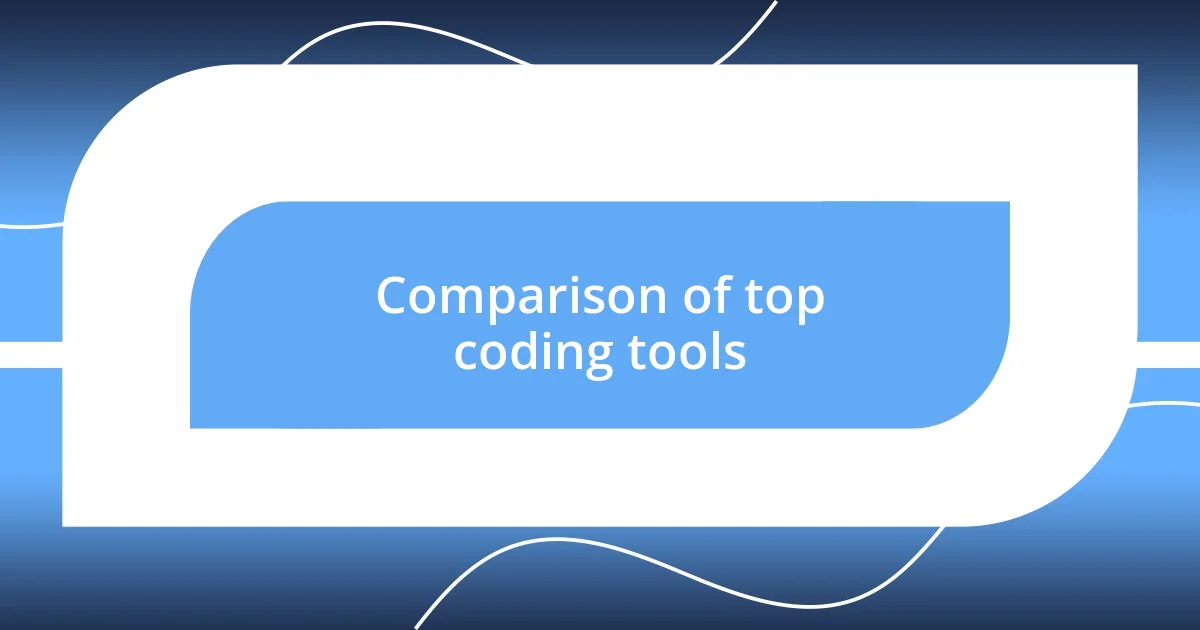
Comparison of top coding tools
When comparing top coding tools, I can’t help but notice how each has its unique strengths. For instance, while Visual Studio Code shines with its robust extensions and sleek interface, I remember feeling a little lost navigating its multitude of features at first. I had to remind myself that, like any good tool, mastering it takes time and practice. Do you ever feel overwhelmed by choices when selecting software?
On the other hand, I’ve found JetBrains IntelliJ IDEA to be an absolute lifesaver for complex projects. It not only improves productivity but also provides an environment where you can really focus. I still think back to that one instance when IntelliJ’s smart suggestions helped me optimize my code during a late-night sprint—it felt like having a mentor right there with me, guiding my every move. Isn’t it amazing how the right tool can turn a stressful coding session into an insightful journey?
Eclipse is another tool worth mentioning, especially for those who dive into multiple programming languages. I’ve had my struggles with its learning curve, but I distinctly remember the moment everything clicked. Configuring plugins to suit my preferences made me feel empowered, like I was customizing my own little coding universe. Have you ever experienced that sweet moment of ‘aha’ when your software finally aligns with your workflow? It’s those moments that truly enhance the coding experience.
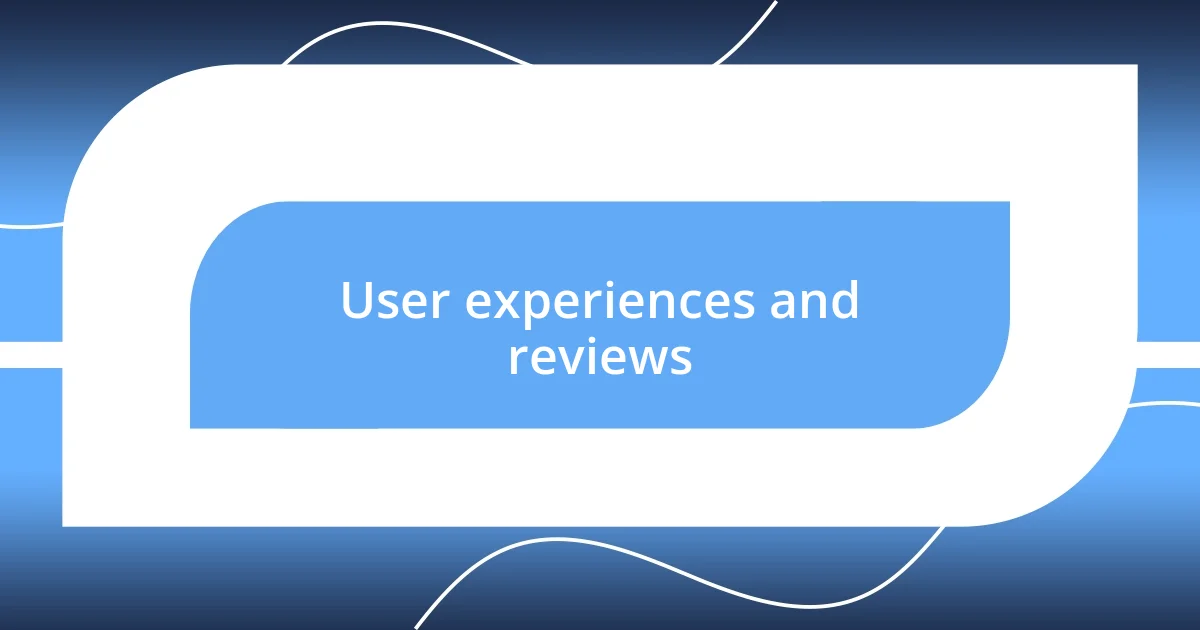
User experiences and reviews
Many users rave about JetBrains IntelliJ IDEA, citing its intelligent code assistance as a game-changer. I once spoke with a developer who shared a story of how IntelliJ not only highlighted errors but also offered suggestions for fixes in real-time. That kind of support can transform a potentially frustrating debugging session into a smooth, streamlined process. Have you ever felt that rush of relief when the software saves you from a potential disaster?
Visual Studio garners mixed emotions among developers. While some find its array of features overwhelming, others appreciate the depth it provides. I remember a colleague expressing sheer excitement when she finally grasped the powerful debugging tools. The sense of accomplishment when you master a complicated piece of software is incredibly rewarding. Have you had a software breakthrough that made you feel like you could tackle anything?
Eclipse often gets a bad rap for its steep learning curve, but the community around it is incredibly supportive. I recall joining a forum where seasoned developers shared tips, making the transition feel less daunting. It reminded me of the camaraderie that exists in the coding world—when you finally unlock the potential of the tool, it’s like discovering a secret code. Isn’t it fascinating how user experiences can shift your perspective on a software?
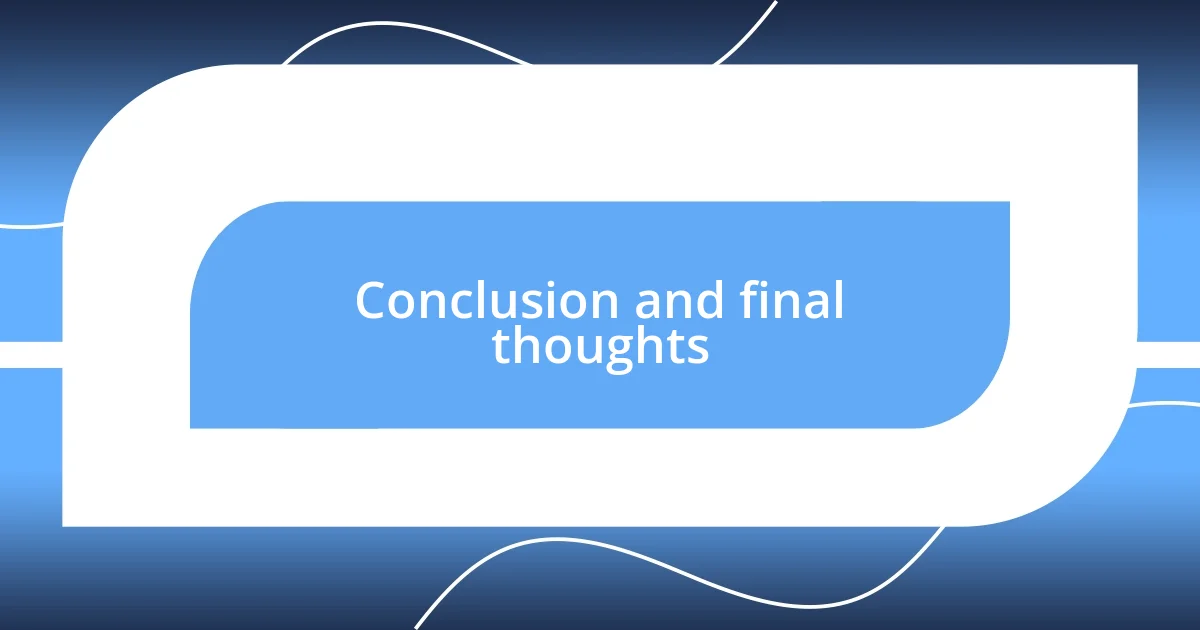
Conclusion and final thoughts
When reflecting on my journey with different coding software, it’s clear that the best choice really depends on individual needs and preferences. I remember a time when I switched from one tool to another, finally realizing how much smoother my workflow could be with the right fit. Have you ever made a change that felt like a breath of fresh air in your coding experience?
The emotional aspect of mastering a coding tool can’t be underestimated. I recall the satisfaction I felt when I finally owned my chosen software, hitting my stride as I customized it to suit my unique coding style. That moment of empowerment is something every developer deserves to experience. Isn’t it exciting to think about how the right software can open new doors in your coding journey?
Ultimately, my final thoughts revolve around the idea that coding software is not just about features; it’s about how it makes you feel and enhances your creativity. Choosing the right tool can turn coding from a chore into a joy. Have you found that special software that resonates with you? That’s what matters most in this ever-evolving tech landscape.












